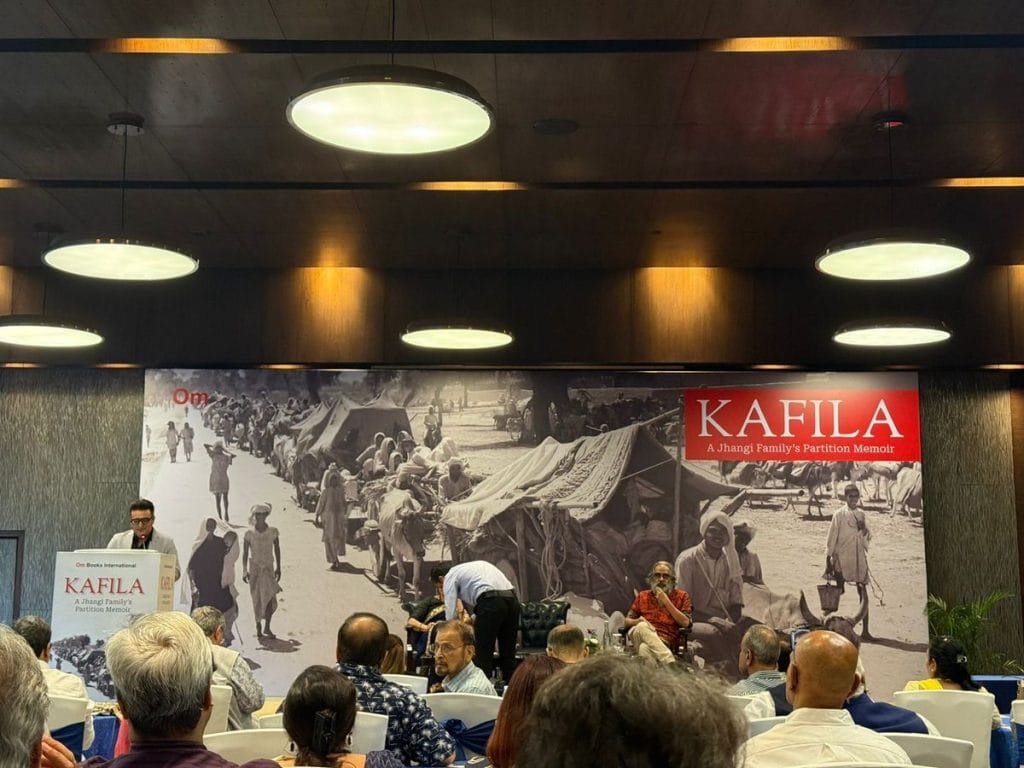New Delhi: Seventy-eight years after the Jhangi community left Pakistan’s Jhang region in kafilas, or caravans, their scattered journeys, stories, and voices have found a home in a new book through the saga of one Punjabi Khatri family.
The book Kafila: A Jhangi Family’s Partition Memoir, by lawyer and author Sumant Batra, opens with his great-grandfather in Jhang’s Rodu Sultan and follows the family from the painful uprooting in Pakistan to the rebuilding in India.
“While history books tell us about the numbers and the politics of the region, Kafila takes us into the hearts and homes of those who lived there,” said the host at the launch at Delhi’s Le Méridien last week.
During the conversation between Batra and Shantanu Ray Chaudhuri, editor-in-chief of Om Books, the discussion turned to the word “refugee.” Batra said many families arriving in India after 1947 resisted the label. “How did I become a refugee in my own country?” he recalled them asking.
An audience member, the “first-born Indian child” in his refugee family, offered another insight: in the struggle for survival, newcomers shed narrow regional identities for a pan-Indian self, not to bury their past but to rise beyond it.
“For a refugee, arrival means a new country, a new revolution, no money, no jobs, no education. The best way to survive was to embrace a pan-Indian identity,” he said.
Among the audience were members of Batra’s extended family and others from the Jhang community. His story was also many of theirs—the exodus from Jhang and starting once again in Haryana’s Hisar, where the Indian government had allocated land to arrivals from the region.
The book was launched by Thakur Das Miglani, a 93-year-old Partition survivor.
“My father could never put his Partition ordeal into words, so I tried to make it easier for future generations to know their past,” Batra told the audience.
Also Read: ‘I refuse your partition’ — Faiz to Shankha Ghosh, how Bengali poets captured 1947 violence
Choosing harmony over bitterness
Batra said that when his family finally reached Hisar, days after violence had swept across newly divided India and Pakistan, they were allotted a barren plot, a stretch of sand mounds that the wind kept shifting.
“They chose to live together as a complete family. They had lost affection for materialistic things,” he said.
Batra took out a black miniature figurine of Lord Krishna from his pocket. He said that during Partition, his grandmother had carried two such idols of Lord Krishna and Lord Ram and a handful of sand from Jhang that remained in their temple over the years.
“They started over initially with the business of selling milk and later moved into the clothing business,” he said, adding that his grandfather always called Partition a “bad time when everyone had lost their senses.”

While Partition stories are often filled with violence, Batra chose to narrate how a Muslim family in Toba Tek Singh, a city in Pakistan’s Punjab province, sheltered his relatives for days and even warned them of an impending attack so they could protect themselves.
Similarly, on reaching India, his family initially found refuge in a Muslim household. Batra said that while it was difficult for his grandmother to prepare her first meal in a Muslim home, the two families lived together harmoniously and developed a strong bond eventually.
“I think it was that mutual respect that made them accept a lot with grace and dignity,” he said, adding that this attitude helped his family prosper. “They never carried any bitterness.”
Also Read: Jinnah wanted Brigadier Mohammad Usman as Pakistan’s Army chief. He chose India instead
Closing the ‘wound’
Batra said he completed the research for his book in about seven months, drawing on stories from his extended family and especially Miglani, who narrated to him how he reached India after Independence.
“I was mesmerised by how sharp his memory of the whole incident was, like it had happened only yesterday,” Batra said.
During Partition, families moved in large groups from Pakistan to India, forming kafilas until they got to a train. The one from Jhang, which included Batra’s family, carried with it stories steeped in Sufism, the rivers Chenab and Ravi, and the timeless romance of Heer and Ranjha.
Miglani, then a teenager, gave Batra rare first-hand accounts of the migration. His memories came “in flashes”, requiring patience to record, but he vividly recalled relatives, villages, and the perilous train journey to India. He also spoke briefly at the launch.
“Our train from Jhang to Hisar, a journey meant to take a single day, stretched into eight,” Miglani recounted in a hushed voice. “We moved by day and halted by night until at last we reached the Attari border, where people had set up langars to feed the weary.” Along the way, the train survived several attacks.
Towards the end of the conversation, Batra said that decades after Partition, the launch of his book leaves him hopeful that in the next 20 years the new generation will make a political difference, if they “come forward and deal with [differences] with awareness.”
In the meantime, he added, speaking and writing about Partition can help provide closure to its enduring “wound”.
(Edited by Asavari Singh)






